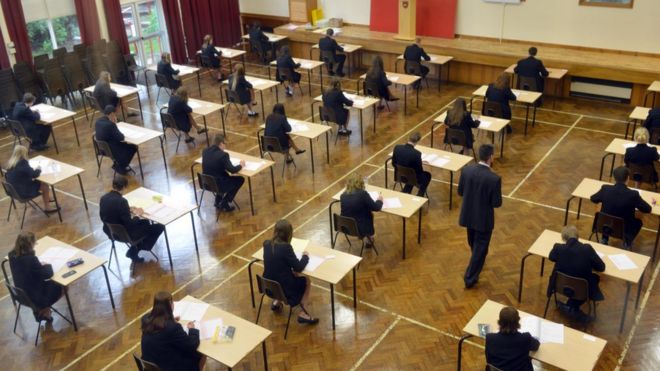Speaker’s Corner: Testing Times – Fear and Fasting in Secondary Schools
One anonymous British school teacher provides some insight on the responses among his student to proposed changes to Exams timetabled to accommodate Ramadan, in order to assist fasting pupils
Testing Times: Fear and Fasting in Secondary Schools.
by Sami Piperdi (pseudonym)

As a Secondary school teacher who works in an establishment with approximately 50% Muslim students, I was particularly interested in the news story that appeared on the BBC website with the headline “Exams timetabled to accommodate Ramadan”.
Ramadan is set to coincide with the public examination season over the next three years, and so could potentially have a significant impact on the exam performance of Muslim students nationally.
A number of my students had already voiced their concerns about this dilemma: whilst some pledged that they would fast throughout their exams and others reluctantly conceded they may have to break their fast, all spoke of this issue with a sense of conflict and trepidation.
Unsurprisingly, the Daily Mail had a completely different angle on the same story. The front page warned that “hundreds of thousands of teenagers” would face an “exam timetable shakeup… to help Muslim pupils fasting for Ramadan.” I thought that the discrepancies in the reporting might make for a thought-provoking lesson on media reporting and bias, and so I planned a lesson where students would be shown both headlines and stories in turn, and then be invited to respond to each. The response was fascinating, giving me both cause for concern and hope.
I started by showing students the following slide. Upon seeing the headline, almost all of the non-Muslim students chimed “aww that’s so nice!” heart-warmingly in unison. Some of these non-Muslim students told me they felt proud that our exam boards were trying to “include everyone” and make sure all students had a fair chance.
The Muslim students, however, wore grim faces. Most remained silent, though one Muslim girl put her hand up and spoke of her fear that this might upset people, making Muslims look like they’re always causing trouble for others (I had not shown them the Daily Mail article yet!). Other Muslim students murmured in agreement, commenting that they didn’t want to seem like a burden on society, and that people ‘don’t like us Muslims too much nowadays’. At this juncture a plucky non-Muslim student intervened to reassure her fellow classmates: “No! We’re all in it together. Why is this even a news story?”
Although it was deeply upsetting to see young, vulnerable Muslim students express concerns about their negative portrayal, I cannot say I was surprised. Though many adults have grown accustomed to the constant negative media portrayal of Muslims and Islam, we don’t often think about the impact it has on young Muslim schoolchildren. Certainly, since the heightened introduction of the Prevent strategy in schools, I have noticed a discernible hesitation among Muslim students to contribute fully in classroom discussions. I have lost count of the number of times I have witnessed the most boisterous of Muslim students suddenly shut down when we talk about an issue where their cultural or religious background might inform their opinion, from topics as diverse as religious imagery in Shakespeare, to the representation of women in poetry. Undoubtedly, Muslim students feel that they have to tread carefully in this current clime, fearing that they are being monitored by teachers who may misunderstand or misconstrue their convictions, meaning trouble for them (or worse – their parents) with school authorities. With endless examples of students as young as 4 being reported to Prevent Officers for innocuous comments – who could blame them? And yet, if schools can no longer be safe-spaces where students can air their views and be challenged – how can we as educators truly broaden our students’ minds?
I then moved onto the next slide featuring the Daily Mail front page, which was met with a collective gasp.
Appalled, one non-Muslim student shouted out “Sir, how can they say that? That’s so horrible!” I scanned the room, once again to find my Muslim students quiet.
“Why is it horrible?” I asked. Students perceptively noted the violence associated with the word “shake up”, and how the imperative phrase “Sit exam early” implied that Muslims were ordering the whole country to follow their rules, rather than the accommodation coming from the Exam board. A quote from the group ‘Christian Concern’ cited in the Daily Mail article particularly disturbed my students: ‘We don’t live in Saudi Arabia where they need to fit the exams around sharia principles. It’s wrong imposing this festival on everybody else.’
“Sir, that’s just racist, and not very Christian!” No prizes for guessing whether this comment came from a Muslim or non-Muslim student.
This lesson left me in a reflective mood. I was impressed at the open hearts of my non-Muslim students, but concerned at the palpable fear felt by young Muslims. A cohesive society can only arise when every member of that society can reach out to other people, whatever their background, and celebrate our differences. How can we achieve this when our own young Muslims have been left so disenfranchised by the media and Prevent that they are too scared to speak up for themselves and reach out to the generous hands offered to them?
Sami Piperdi is a teacher and educator, who has worked in educational research and practice for six years. Sami currently works as a Secondary English teacher in an inner-city comprehensive. Alongside this role, Sami also works as a teacher coach and teacher trainer.


